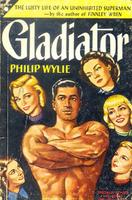Book Review: GLADIATOR

For forty years, I heard that Superman, the template for all modern superheroes, was inspired by Philip Wylie’s 1930 pulp sci-fi classic Gladiator. I’ve been a comic book fan since age six and grew up watching the old George Reeves Adventures of Superman TV episodes over and over, so you’d think I’d have read Wylie’s novel long ago. Well, I finally read it last week.
The comparisons to Superman are striking. Gladiator’s Hugo Danner, like
Where Gladiator differs most from the Superman saga is in its grimness. Hugo keeps his powers a secret, like Clark Kent, because he wants to “fit in” and lead a “normal” life. But there the similarity ends. Whereas

Gladiator is, I think, more “realistic” than the Superman saga. As a kid, I used to dream of having super powers and using them to save lives and impress my friends. I imagined that everyone would admire me and desire my friendship, because I was, well, super. Now, forty years later, the tragic life of Hugo Danner seems more probable than the exciting life of
I enjoyed Philip Wylie’s novel, and I admire it as an early sci-fi landmark. But I won’t embrace the book’s message of heartbreak and personal destruction, no matter how realistic it seems. Give me, instead, the improbable optimism of the Superman mythos, where heroes pursue their destinies largely undeterred.
Technorati Tags: Books













2 Comments:
For some classic "Old School" heroes you can never go past E.E.(Doc) Smith and his 'Lensman' series! That and 'Carter on Mars' by Burroughs:-)
Hey, Grinna!
Have never read the Lensman stuff but probably should. John Carter is aces with me, as I've written before on this blog. Tarzan rules, though.
Post a Comment
<< Home